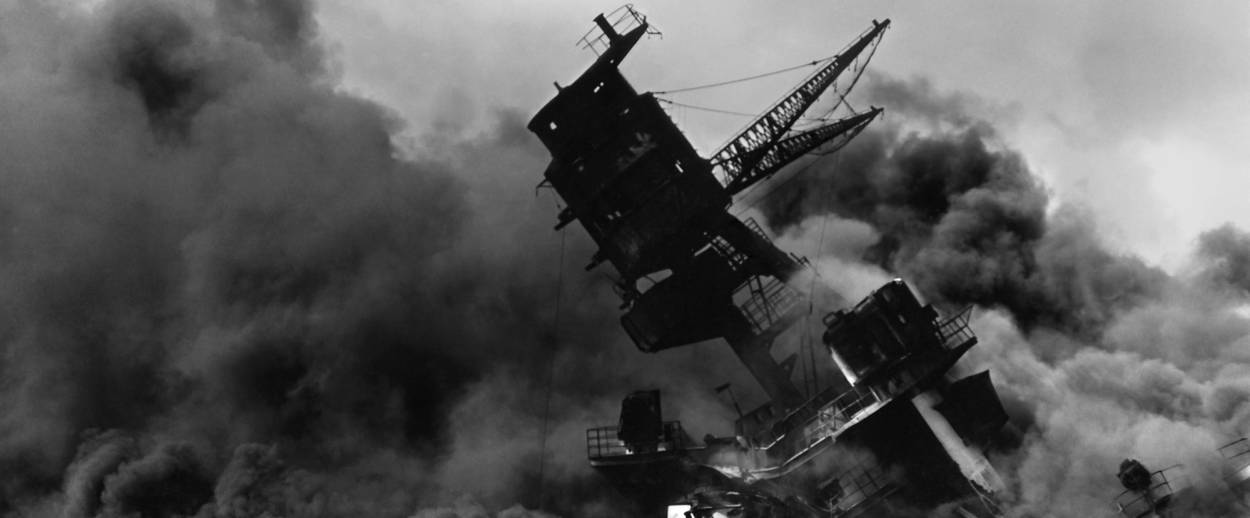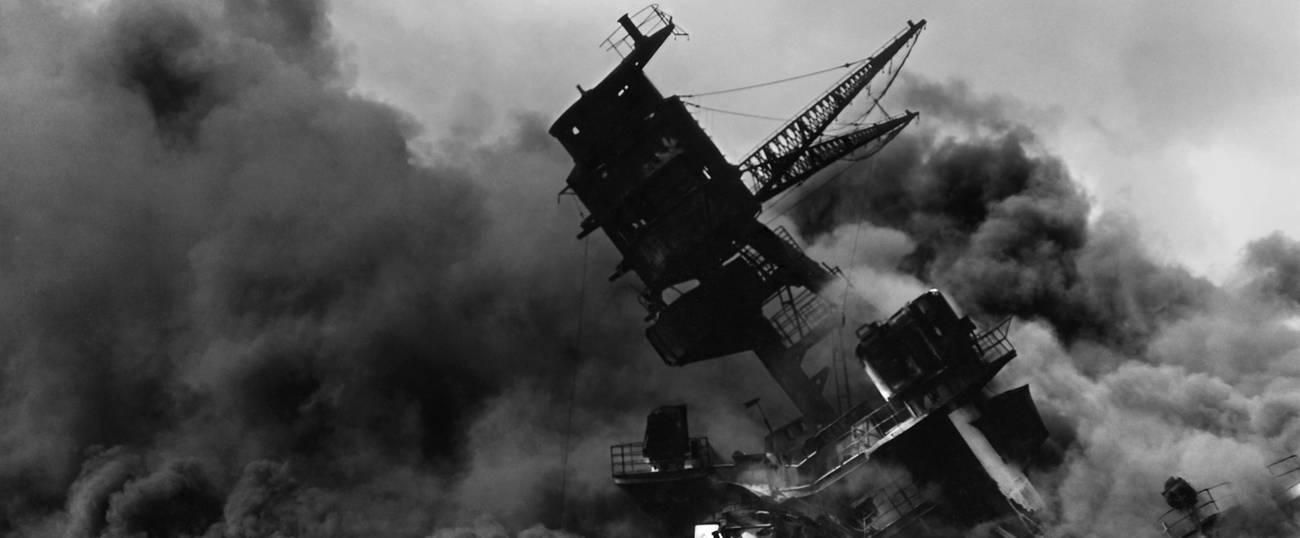‘There Would Be No Pearl Harbors for Us’
As a child, I yearned for a chance to fight a good, clean war like my uncle, who enlisted after Japan attacked. Instead, I got Nixon and a lesson about God’s complicated plan.




On the morning of December 7, 1941, my father, in his knicker pants, went to his friend Walter Stickney’s house on Macombs Road in the West Bronx to play marbles and jacks. They were both twelve years old. As they played in his apartment, a bulletin came over the radio: The Japanese had attacked Pearl Harbor.
Shortly after that infamous day, my father’s older brother, my Uncle Gus, was called up. My grandfather—the diminutive Galitzianer who spoke no English—went down with Gus to the army induction center at Grand Central Station. My father told me that Grandpa Abe, who had many times been to Grand Central, on that day could not find his way out of the terminal. He was lost in its catacombs mumbling in Yiddish until kindly people led him out of the station and into the 1940s daylight. His son had gone to war. The country was at war, and he lost access to who he was and where he was.
Gus was posted to Benghazi, where he fought Rommel and Arabs unfriendly to American troops. One day, a mysterious package arrived at the Bronx. It was Gus’ talis and tefillin—he felt he had no use for them on the front lines of the war. My grandparents, though not especially devout, were devastated. Gus would go the way of godless America, they thought. The tallis and tefillin sat on the table for the duration of the war—part shame, part pride. Gus wasn’t davening, which was a shanda, but Gus was a GI in combat, pure nachas.
Perhaps that was the moment my father, the Bronx boy from PS 82 and De Witt Clinton High, resolved to become a rabbi. “I have to make my parents happy. I have to carry the tradition. Who else will?”
It wasn’t a rhetorical question, or, at least, not entirely. Remembering and transmitting memory is not a neutral activity. A person’s memory is a mash-up derby of the banal, the seminal, the utterly personal, the idiosyncratic, the tribal, the national, and the historic.
By unz—a small band of devout Jews with Yiddish-stained tongues and teeth—there was no such thing as “history.” History was for the goyim. “They” had an endless chronicle of succession of kings and queens and bloody wars. “Our” history was a flat line—book-ended by the destruction of the temple 2,000 years ago and our expulsion from the land on the one end and the eventual coming of the Messiah all the way at the other end. There was nothing in between that could qualify as history. We were all part of God’s plan and our sojourn into the United States was nothing more than a passing phase.
This has been our lot in Russia, too. My father had told me of the Cantonists—conscripted children of Russia in the 19th century khapped at the tender age of eight or nine for 25 years or more of military service and forced conversion to fight the goy wars; pale, coughing yeshiva boys devoured by the maw and the ever-thirsty-for-blood goyim.
One apocryphal story dad handed down: A ten-year-old boy conscripted by the Czar, his poor parents running after the Czar’s agents and shouting at the child: “Don’t forget! Your name is Yankele!” As he was beaten and dunked in forced baptism in the freezing waters, he kept saying “My Name is Yankele” until they finally let him go.
And yet, even as they deeply distrusted the use of force and the march of armies, my family members were patriots. Both my uncles served, and my father later joined the Air Force in 1953 as a chaplain. It was easier for them to wear uniforms: Pearl Harbor was a moment of clarity, of America coming under attack, that removed all doubt.
Growing up in the 1970s, I dreamed of a Pearl Harbor moment of my own, a crystalizing occurrence that would allow me to join my elders, ship off to war, and fight the good, clean fight like the one Gus waged on the desert plains of El Alamein.
However, even at the age of seven, I realized I would not be given the moment. Though I fantasized about being an American War Hero, rushing a machine gun nest, I paid close attention to Walter Cronkite and after the second battle of Quang Tri in 1972 I understood that Vietnam was not the war that Uncle Gus fought.
Instead, I watched the adults around me, my parents, my grandparents whose fondness for America was boundless, but they were distrustful of its culture. War was bad. Yet America was good. One was a patriot, but a Jewish boy should avoid the draft because the army would make you un-Jewish. Yet they also knew that the new love that America was giving birth to, sex, drugs and rock and roll was also bad, would also make you un-Jewish. These two opposing pieces of knowledge—an embrace of America, but a rejection of its popular ethos was not explored, but the conflict was instead cleverly used as a wall to preserve our insularity, our shtetl of the mind.
My sisters were permitted the obligatory David Cassidy and Donny Osmond posters which hung prominently in their room but in my memory, the serious cultural confusion was kept at bay as though it could, like the cold of winter Sabbath eves, be kept just outside the window panes of our Queens home.
I watched, too, in 1974, as Nixon, leaving the Oval Office for the last time, stood on the tarmac, flashing a V-for-victory sign with his fingers while standing next to his wife Pat. The scene flashed across television screens all over the globe: The president of the world’s greatest superpower quits office—a first. My Yiddish-British mother’s reaction? “Look, look at Pat Nixon,” she said to me, as she folded laundry. Mrs. Nixon was wearing a long-sleeved dress, despite the oppressive August heat in Washington. “She is dressed like a rebbetzin–a rabbi’s wife.” I was 11 years old, but a part of me understood clearly that there was something deeply sorrowful about the disgraced Commander in Chief letting go of his power. My mother was more right than she could’ve imagined: Like a rabbi and his wife, the Nixons stepped into that helicopter and out of history. They, too, were now part of God’s plan.
Could I ever escape it? As I grew up, I read about Yakov Bok, the protagonist in Bernard Malamud’s masterpiece The Fixer, who let his ‘prayer things’ fall with a plop into the Dnieper River to sink like lead. Phillip Roth wrote about his father Herman who left his tefillin in a locker at the Y never to retrieve them, not even to pass them on to Phillip or his descendants. These pieces affected me even as Grandpa Abe’s tefillin lay in a drawer for me when I would become of age.
There was not a shred of doubt that I would wear them even as I believed in imperfect faith that the tefillin were a gift and a commandment from God. Through the years I thought about Gus and his tefillin. With perfect certainty he mailed them home. At times, I wanted to mail mine home too, but my tefillin, I firmly fastened on my head. Faith with its seesaw of uncertainty can be its own form of combat.
We believers full of doubt could only dream of moments of such certainty; as there would be no Pearl Harbors for us.
Alter Yisrael Shimon Feuerman, a psychotherapist in New Jersey, is director of The New Center for Advanced Psychotherapy Studies. He is also author of the Yiddish novel Yankel and Leah.